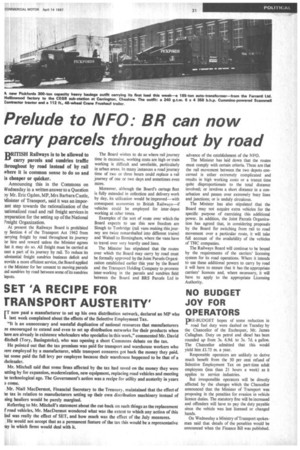Prelude to NFO: BR can now carry parcels throughout by road
Page 33

If you've noticed an error in this article please click here to report it so we can fix it.
BRITISH Railways is to be allowed to carry parcels and sundries traffic throughout by road instead of by rail where it is common sense to do so and is cheaper or quicker.
Announcing this in the Commons on Wednesday in a written answer to a Question n Mr. Eric Ogden, MP, Mrs Barbara Castle, Minister of Transport, said it was an imporAnt step towards the rationalization of the iationalized road and rail freight services in ,reparation for the setting up of the National Freight Organization.
At present the Railways Board is prohibited )37 Section 4 of the Transport Act 1962 from ;arrying freight by road throughout its journey Or hire and reward unless the Minister agrees hat it may do so. All freight must be carried at east a part of its journey by rail. To reduce its ;ubstantial freight sundries business deficit and provide a more efficient service, the Board applied o the Minister for her consent to moving parcels Ind sundries by road between some of its sundries lepots. The Board wishes to do so where rail journey time is excessive, working costs are high or train working is difficult and unreliable, particularly in urban areas. In many Instances a road journey time of two or three hours could replace a rail journey of one or two days and sometimes even more.
Moreover, although the Board's cartage fleet is fully extended in collection and delivery work by day, its utilization would be improved—with consequent economies to British Railways—if vehicles could be employed for inter-depot working at other times.
Examples of the sort of route over which the Board expects to use this new freedom are Slough to Tonbridgc (rail vans making this journey are twice remarshalled into different trains) and Walsall to Birmingham, where the vans have to travel over very heavily used lines.
The Minister has stipulated that the routes over which the Board may carry by road must be formally approved by the Joint Parcels Organization established earlier this year by the Board and the Transport Holding Company to promote inter-working in the parcels and sundries field between the Board and BRS Parcels Ltd in advance of the establishment of the NEO.
The Minister has laid down that the routes must comply with certain criteria. These are that the rail movement between the two depots concerned is either extremely complicated and results in high working costs or a transit time quite disproportionate to the total distance involved; or involves a short distance in a conurbation and passes over extremely busy lines and junctions; or is unduly circuitous.
The Minister has also stipulated that the Board may not acquire extra vehicles for the specific purpose of exercising this additional power. In addition, the Joint Parcels Organization has agreed that, in considering proposals by the Board for switching from rail to road movement over a particular route, it will take full account of the availability of the vehicles of THC companies.
The Railways Board will continue to be bound by the requirements of the carriers' licensing system for its road operations. Where it intends to use these additional powers to carry by road it will have to ensure that it has the appropriate carriers' licences and, where necessary, it will have to apply to the appropriate Licensing Authority.
























































































































